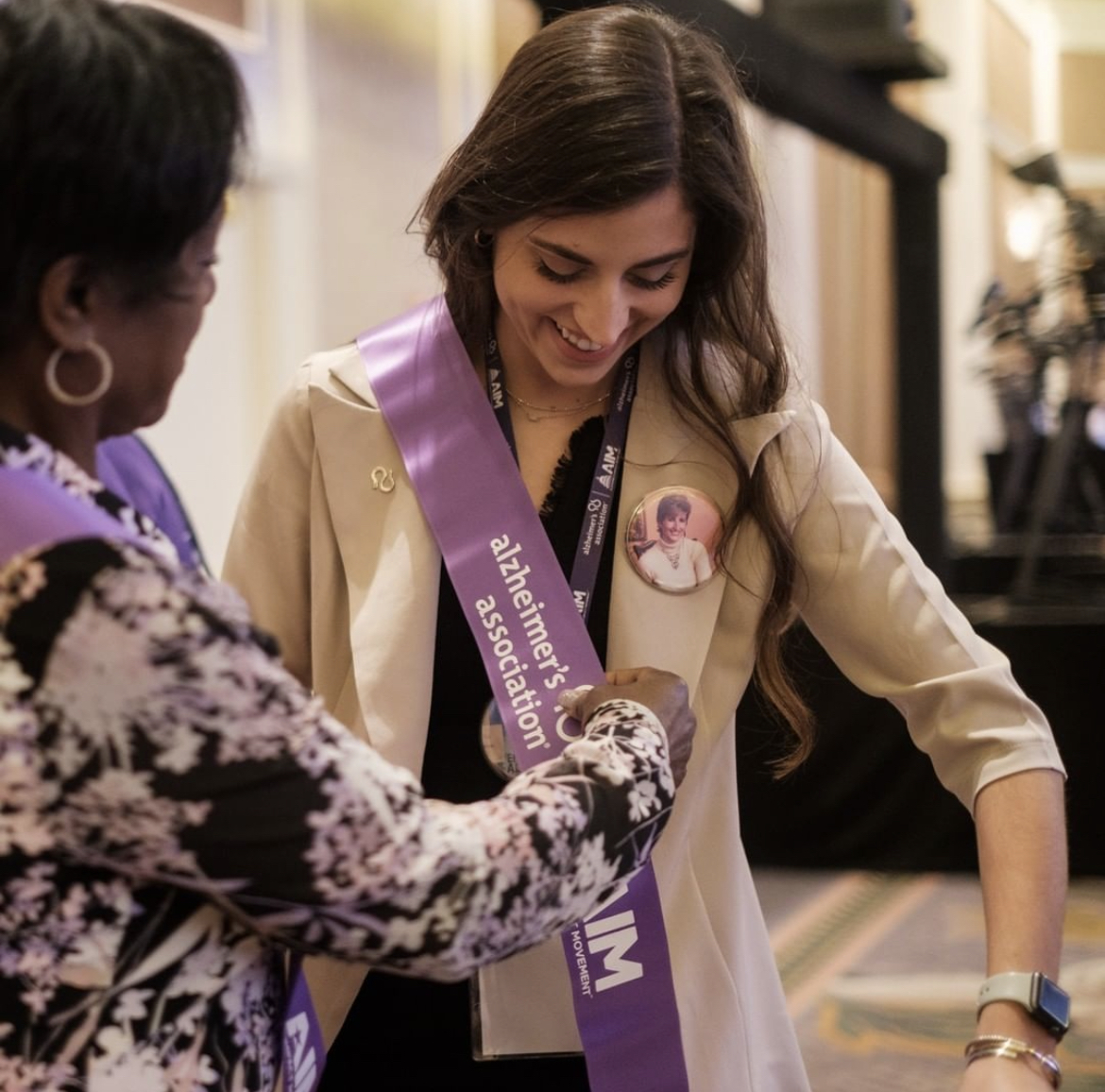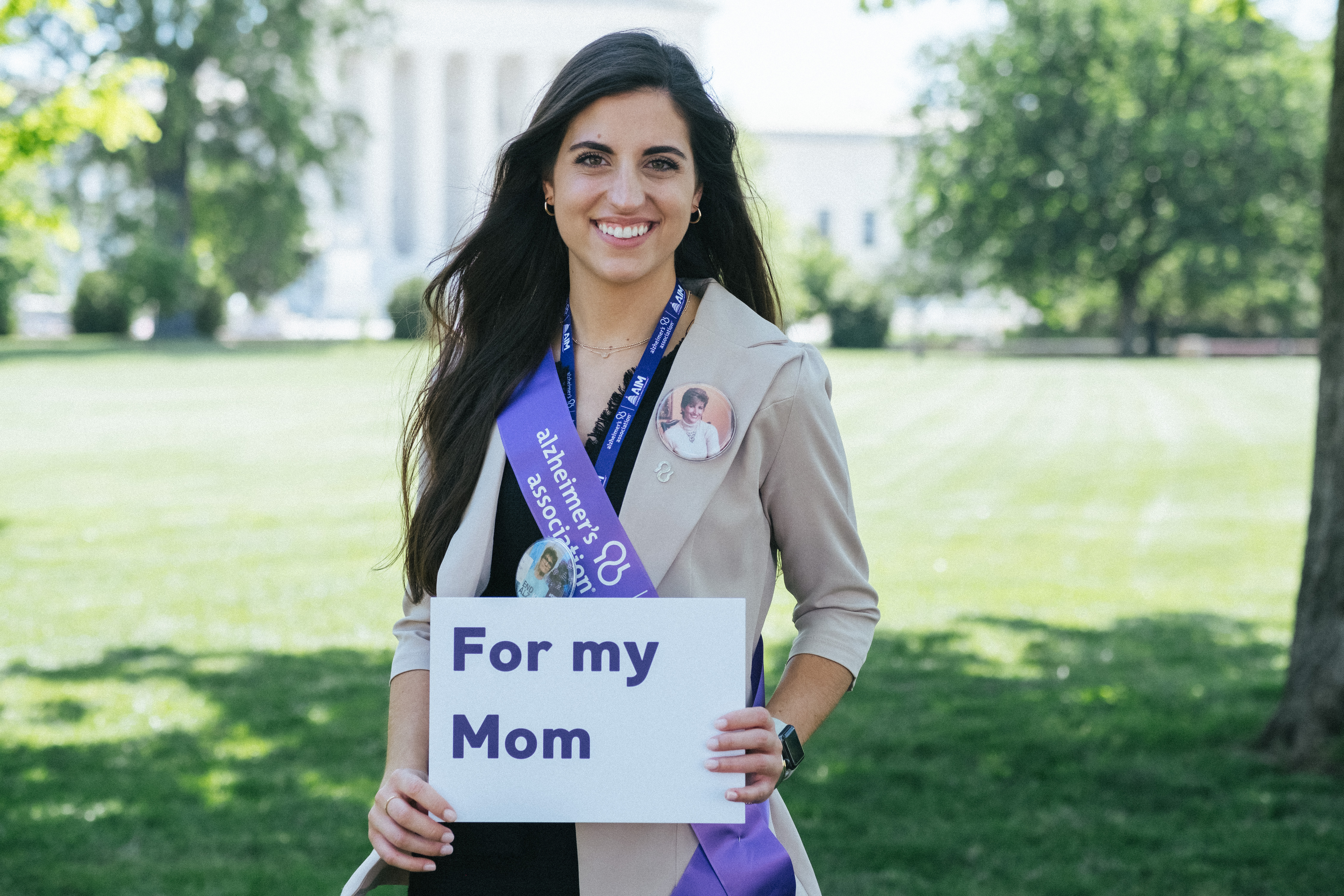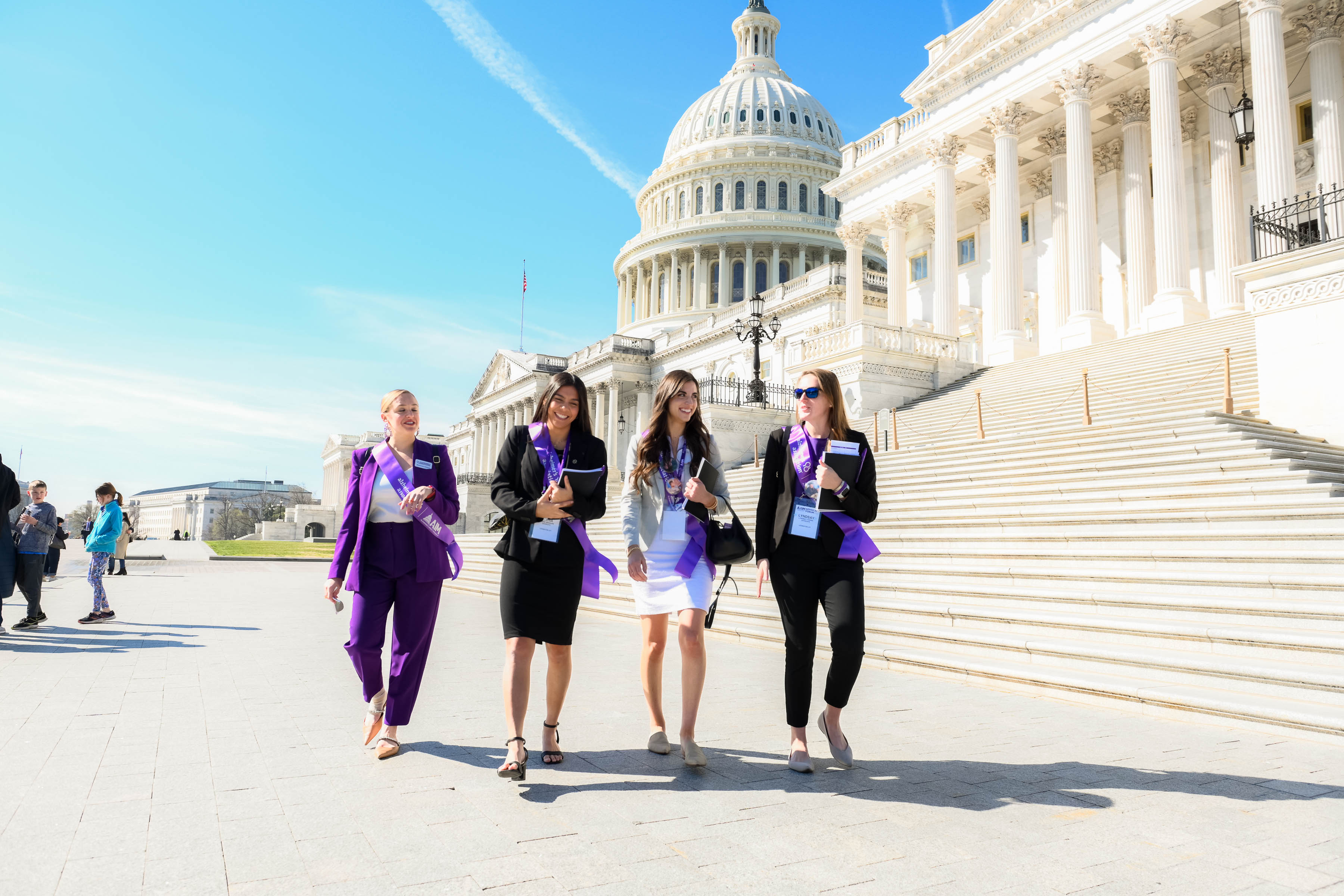Each month, we’re featuring an advocate who engages with policymakers to ensure priorities that improve the lives of people impacted by Alzheimer’s and all other dementia remain top-of-mind in Congress.
When Sophia Sawaya of Lexington, Kentucky was 10 years old, her mom Kalliopi “Kallie” Theodore was diagnosed with early onset Alzheimer’s at the age of 50. Growing up, Sophia saw her mom navigate living with Alzheimer’s while raising her children with her husband Peter. Now 27 years old, Sophia is proud to be a voice for her mom and others living with dementia through her advocacy.
“I was 10 years old when my mom was diagnosed,” said Sophia. “In no way did it impact my childhood, because she was the most incredible mother. Maybe she was a few minutes late to pick me up, but also how much of that is just her being Greek,” she jokes.
Upon her diagnosis, Sophia saw her mom immediately focus on preventative measures she could take to slow down the progression. “There were no FDA-approved medications like there are now,” said Sophia. “She exercised consistently twice a day: go to the gym at 5 a.m., run every afternoon. She was reading positive affirmations, focusing on the here and the now. She’s a very active Greek woman, so her Mediterranean diet was easy to incorporate for her. Healthy eating, volunteering, stimulating her mind in any way. She took Spanish classes.”
But by the time Sophia and her sister had gone to college, they started to notice a change in her cognitive health. “By my senior year of college, I was trying to go home in between classes. I wasn’t really caring for her. It was just more of being there, helping out in little ways,” said Sophia.
After college, she moved to northern Virginia and started a master's program at George Washington University. But shortly after her move, the COVID pandemic started.
“When COVID came, my mom really started to decline. And that’s when we noticed real behavior changes,” said Sophia. “My classes were online, so I was traveling back and forth between Virginia and Lexington.”
By the start of 2021, Sophia realized, “I am so unhappy being away from home. I have to be home. I have to care for my mom.”
That year, Sophia took a leave of absence from her master’s program, and she and her dad became full-time caregivers for Kallie. “My dad and I have navigated a few different ways. It’s been such a process, and it felt like we had to become experts in this disease, understand where to find support.”
Getting a handle on caregiving and getting a little bit of help when they could, Sophia realized, “I have some time on my hands. I couldn’t commit to a job, and I couldn't be in class. But I knew I could handle something, so I googled the Alzheimer’s Association,” said Sophia.

“Advocacy was the first thing that came up. I thought, ‘I don't know anything about politics. But I got in contact with the policy director of the Kentucky chapter and she told me I just need to be an expert on my story,” said Sophia.
“It used to be hard for me to share with my friends or anyone that my mom had Alzheimer's. Because I thought if I said, ‘My mom has Alzheimer’s,’ then that took away [the fact] that she's Greek, that she's extremely intelligent, that she loves literature, that she's learned so much. She’s extremely independent and a wonderfully nurturing mother. In my head, it was almost like it stripped all of that from who she was. That was heartbreaking for me. So [advocacy] was a way of becoming her voice. It's like saying, ‘Look, they are still this person. They deserve so much respect, they have so much integrity. And this diagnosis doesn't take all of that away from them.’”
Today, Sophia works as an activities coordinator at a local day care center Kallie has been attending for the past two years. “I get to be with my mom all day, which is a huge part of it, but I get to advocate for all of the other participants that are here. They're wonderful. And I love working here.”
As an activities coordinator, Sophia organizes cognitive, stimulating activities with purpose. “We have a weekly theme. This week is International Week, which is so fun because I get to talk about Greece…We’re doing a whole world game. It's so fun.”
For Sophia’s masters program, she was able to transfer programs to Eastern Kentucky University. She is currently working on her masters in school counseling and her licensure in clinical mental health counseling.
In April, Sophia attended her third AIM Advocacy Forum in Washington, D.C. “It’s incredible. It has been wonderful getting to go, share my experience, and show [policymakers] the names and faces to the statistics,” said Sophia.

Additionally, Sophia has attended Kentucky’s State Advocacy Day. Following this year’s event, Sophia heard that a legislator that she had met with had decided to take action to help pass a bill requiring continuing education on the early detection and diagnosis of dementia for nurse practitioners and physician assistants.
“To think that meeting with a legislator and having her hear your story, that it really made the difference that we needed, that was incredible to hear,” said Sophia.
Becoming involved as an advocate has also led to new friendships for Sophia. She has stayed in touch with several of her fellow Kentucky advocates who have attended the Forum in the past. And last week, two of the advocates she met at the Forum this year met up to play trivia.
“That's the incredible thing about Forum, getting together in person — you’re surrounded by people who all understand,” said Sophia. “They all understand what this disease is, and it’s impacted all of them. It’s heartbreaking that there are so many that understand, but it's also empowering that all of our voices are coming together with all that passion and really making the difference that we need.”

Sophia’s passion for advocacy has led to her pursuing other volunteer opportunities with the Alzheimer’s Association. She was a community educator a couple of times this past year, and she co-led a support group and had an opportunity to lead a support group over winter break. She also created a team this past year for her mom for the Walk to End Alzheimer’s, and she is currently planning a ping pong tournament for The Longest Day.
“When so much is out of control and so much is unknown, [volunteering gives me] a sense of I’m doing something. I’m caring for my mom. I know I’m doing something. But to speak out for more than just her, for all of these individuals who are incredible people,” said Sophia. “[Alzheimer’s] took away their voice. And that's why I want to be their voice, for my mom and for everyone through this disease.”
“The person that was there, they’re still there. That’s why I like the quote: ‘To love someone is to know the song in their heart and sing it to them when they have forgotten.’ That’s what it is like. They may have forgotten it, but we’re here to bring that out.”